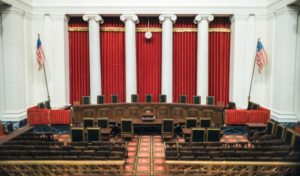
President Biden takes executive climate actions, the House passes bills to protect reproductive and marriage rights, and more…
IN THE NEWS
- President Joseph R. Biden issued executive actions that seek to protect communities from extreme weather and increase clean energy jobs. President Biden directed the Federal Emergency Management Agency to allocate $2.3 billion in funding to help protect communities from extreme weather. President Biden also ordered the U.S. Department of Health and Human Services to expand its Low Income Home Energy Assistance Program to provide households with efficient air conditioning and more financial assistance for home energy costs. In addition, President Biden announced that the U.S. Department of the Interior plans to expand offshore wind development in the Gulf of Mexico. President Biden stated that he intends to “clear every federal hurdle and streamline permitting to bring these clean energy projects online.”
- The U.S. House of Representatives passed three bills that would protect reproductive rights following the U.S. Supreme Court’s Dobbs decision, which overturned Roe v. Wade. If enacted into law, the Women’s Health Protection Act would codify the right to terminate a pregnancy, while the Ensuring Access to Abortion Act would prohibit interference with interstate abortion services. The House also passed the Right to Contraception Act, which would codify the right to birth control. Commentators expect both abortion bills to face considerable Republican opposition in the Senate, and foresee similar opposition toward contraception access.
- By a 267-157 vote, the House passed the Respect for Marriage Act, which would ensure that same-sex and interracial couples are treated the same under federal law as all other married couples. If signed into law, the act would prohibit state officials from not recognizing out-of-state marriages on the basis of sex, race, ethnicity, or national origin. The act would also repeal the Defense of Marriage Act (DOMA), which defined marriage for federal purposes as a union between one man and one woman. Although the Supreme Court ruled DOMA unconstitutional in United States v. Windsor, the Respect for Marriage Act would codify a repeal of the unconstitutional law. Senator Tammy Baldwin (D-WI) stated that the bill “will enshrine and protect marriage equality and make sure legal, same-sex and interracial marriages are recognized.”
- A federal judge in Tennessee temporarily blocked the U.S. Department of Education’s Title IX guidance, which explained that public schools are prohibited from discriminating against students on the basis of gender identity or sexual orientation. The Education Department guidance directed that it would investigate public schools that prevent transgender students from joining athletic teams or using restrooms that correspond to their gender identities. The judge ruled that the guidance is unlawful because it “interferes with and threatens … states’ ability to continue enforcing their state laws.” The Education Department’s interpretation of Title IX stems from Bostock v. Clayton County, in which the Supreme Court ruled that Title VII of the Civil Rights Act protects LGBTQ+ employees from discrimination.
- A bipartisan group of Senators introduced two bills to reform election laws in the wake of the events of January 6, 2021, and President Donald Trump’s alleged attempts to overturn the 2020 election. One bill would reform the Electoral Count Act, an 1887 law that governs the process of counting Electoral College votes, by raising the threshold of members needed to object to a state’s elector from one member of each house to 20 percent of the members of each house. That bill would also clarify that the vice president only has a ceremonial role in certifying election results, following Trump and his supporters reportedly attempting to force former Vice President Mike Pence to overturn the election result. The second bill would increase criminal penalties for individuals who alter election results or threaten or intimidate poll workers, voters, or candidates.
- Senator Joe Manchin (D-W.Va.) reportedly told Senate Majority Leader Charles E. “Chuck” Schumer (D-N.Y.) that he would oppose a proposed bill that would raise taxes on the wealthy and direct as much as $375 billion towards climate and energy programs. Manchin stated that he instead wants to wait until July interest rates come out before agreeing on climate provisions. Leah Stokes, a professor at the University of California-Santa Barbara who assisted with the climate reconciliation package, noted that “one senator who is clearly in bed with the fossil fuel industry is condemning generations of Americans on this planet to a broken Earth, including his own grandchildren.” Democratic leaders have decided for now to move forward on a slimmed-down bill that lowers the cost of health care premiums and prescription drugs.
- The Centers for Disease Control and Prevention (CDC) ended its monitoring program of COVID-19 levels on cruise ships and removed a chart detailing cruise case levels from its website. The CDC had previously stipulated testing requirements and a phased approach to resuming cruises through its Framework for Conditional Sailing Order, which was binding for most of the pandemic but became voluntary in January. Cruise restrictions faced legal opposition, such as from Florida Governor Ron DeSantis who sued the CDC for passing the conditional sailing order. The CDC acknowledged that cruising still poses some risk and stated that it plans to continue to publish health guidance for cruise ships.
- U.S. Federal Communications Commission Chair Jessica Rosenworcel proposed increasing the minimum broadband speed from 25 megabits per second (mbps) for downloads and 3 mbps for uploads to 100 mbps and 20 mbps, respectively. Chair Rosenworcel observed that the “needs of internet users long ago surpassed” the current standard, set in 2015. Several members of the Senate applauded the proposal as a step toward ensuring underserved rural communities have access to high speed internet.
WHAT WE’RE READING THIS WEEK
- In an article in the Wisconsin Law Review, Keith A. Findley, a professor at the University of Wisconsin Law School, and several coauthors explored how prosecutors use their plea-bargaining power to pressure defendants to accept guilty verdicts during post-conviction litigation, even when the chances the defendants are innocent are high. Findley and his coauthors found that prosecutors offered plea bargains in 23 percent of post-conviction cases involving defendants who had high likelihoods of innocence and that prosecutors offered, on average, a 45 percent reduction in original sentences. Findley and his coauthors suggested reforms to minimize the risk that prosecutors will preserve wrongful convictions, including increased judicial involvement in reviewing plea bargains and banning post-conviction plea bargaining.
- In a draft article, Leah Litman, assistant professor of law at the University of Michigan Law School, and Daniel Deacon, a lecturer at the University of Michigan Law School, argued that the Supreme Court has interpreted the major questions doctrine as requiring explicit congressional authorization of agency policies, regardless of the plain meaning of the applicable statute. Litman and Deacon found that the Court, in assessing whether an agency rule is valid, has given increasing weight to the political significance of an agency policy, the novelty of the policy, and the possibility that other agency policies could be justified by the agency’s statutory rationale. Litman and Deacon warned that the Court’s new approach to the major questions doctrine may allow politics to inform the Court’s interpretation of statutes and “supplies an additional means for minority rule in a constitutional system that already skews toward minority rule.”
- In a Brookings Institution report, senior fellow Homi Kharas, argued that advanced economies, such as those in the United States and the European Union, need to provide trillions of dollars to developing countries to fund projects that reduce carbon emissions to meet net zero goals. Kharas explained that developing economies require massive investments and institutions that support sustainable growth—much like what countries needed in post-World War II Europe. Kharas concluded that the Truman Administration’s Marshall Plan, which coordinated over $12 billion in direct investment to post-war Europe, provides a model approach and he recommended adopting nine lessons from the Plan, including non-political implementation and local ownership of decarbonization projects.
EDITOR’S CHOICE
- In an essay in The Regulatory Review, Tim Brennan, a professor at the University of Maryland, Baltimore County School of Public Policy, argued that science-driven policy debates, such as those that concern climate change and COVID-19, force opposing sides to accept or reject science. Brennan suggested, however, that policy turns on moral considerations outside the scientific realm and concluded that policy discussions should therefore center on values as a means of avoiding policy questions centering on the acceptance or rejection of science.



